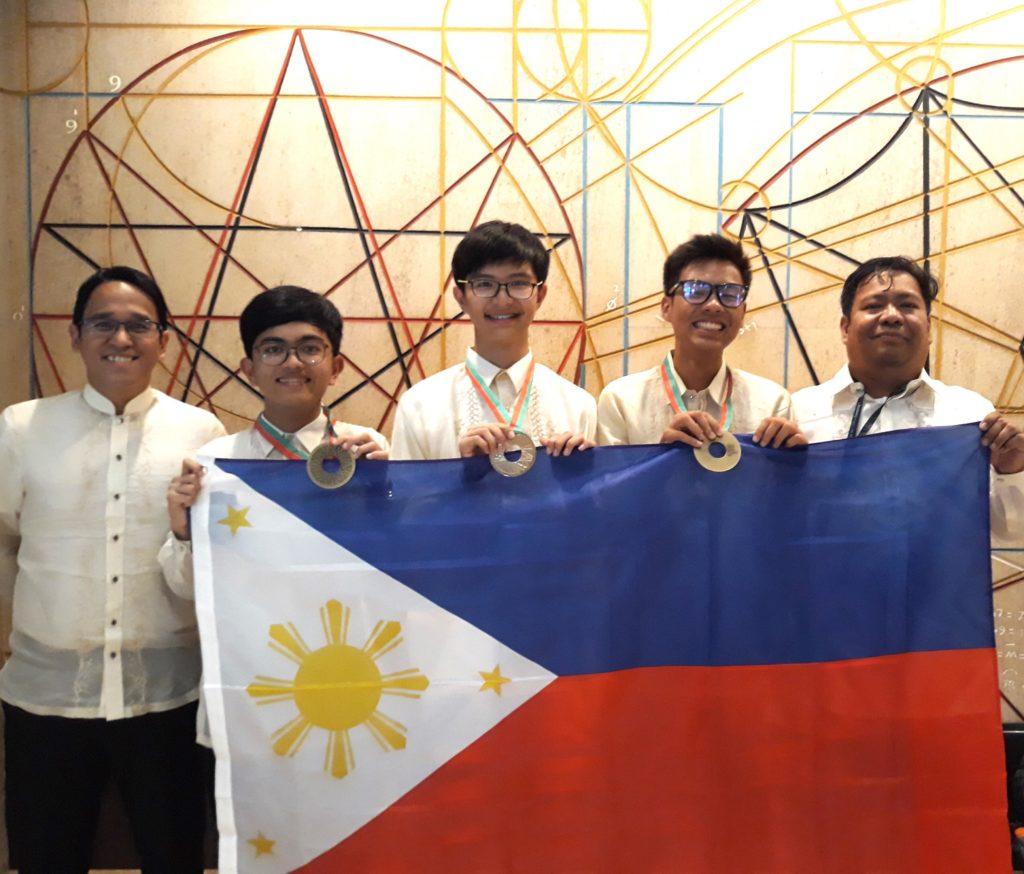Bearing the Philippine flag with pride, three Filipino students became a nigh-unstoppable force at the 49th International Physics Olympiad (IPhO), taking the country closer to gold than it has ever been at the annual worldwide competition.
Steven Reyes, who hails from St. Jude Catholic School (SJSC), bagged a silver medal for the Philippines. Meanwhile, Mikhail Torio from the Philippine Science High School-Main Campus (PSHS-MC) and Charles Bartolo from the Philippine Science High School-Central Luzon Campus (PSHS-CLC) each brought home a bronze medal.
Overall, the Philippines placed 34th out of 87 delegations that participated in this year’s IPhO, achieving the best ranking in 13 years of participation. Reyes, Torio, and Bartolo ranked in the 88th, 68th, and 58th percentiles, respectively, out of a total of 396 student-delegates.
Accompanied by team co-leaders Prof. Perry Esguerra and Prof. Ian Vega (both from the UP National Institute of Physics), the team completed in Lisbon, Portugal last July 21 to 29.
To prepare for the competition, Reyes, Torio, and Bartolo underwent intensive training under Prof. Esguerra, Prof. Vega, and Michael Solis of the Theoretical Physics Group and team co-leader Prof. Nathaniel Hermosa of the Photonics Research Laboratory at the National Institute of Physics. They also received training and guidance from coaches Russel Odi (SJSC), Vinni Dajac (PSHS-MC), Rex Forteza (PSHS-CLC), and Lemuel Pelagio Jr. (PSHS-CLC).
This year’s problems involved the detection of gravitational waves, the ATLAS instrument at the Large Hadron Collider, and the physics of blood flow and tumor growth for the theoretical exam, and paper transistors and the viscoelastic properties of a polymer thread for the experimental exam.

Building momentum
Each year, the IPhO gathers teams of secondary school students from around the world to compete against each other in a set of individual theoretical and laboratory physics exams. The first-ever IPhO took place in 1967 in Warsaw, Poland, featuring delegates from 5 countries.
The 2018 IPhO marks the 13th time the Philippines joined the competition, having first participated in 1993.
“Lack of guaranteed institutional and funding support was a problem then, as it is now,” according to team co-leader Dr. Reina Reyes. “But a group of us are determined to turn things around, so students of the next generation can have the opportunities that we missed.”
The Philippines competed in the 2018 IPhO with generous support from the Unilab Foundation, the Philippine Science High School Foundation, Inc. (PSHSFI), PSHS-MC, PSHS-CLC, SJCS, and individual donors from the physics community.
The Philippine team plans send another delegation to the 2019 IPhO, which will be held in Tel Aviv, Israel.
For more details, interested parties may contact the Philippine IPhO team at ipho.team.ph@gmail.com.
Cover photo: Brainbuxa.com
Reference:
- Official press release (August 2, 2018).
Author: Mikael Angelo Francisco
Bitten by the science writing bug, Mikael has years of writing and editorial experience under his belt. As the editor-in-chief of FlipScience, Mikael has sworn to help make science more fun and interesting for geeky readers and casual audiences alike.







